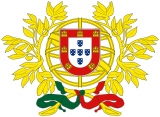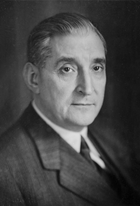1945 Portuguese legislative election
| |||||||||||||||||||||||||||||||
120 seats to the National Assembly 61 seats needed for a majority | |||||||||||||||||||||||||||||||
|---|---|---|---|---|---|---|---|---|---|---|---|---|---|---|---|---|---|---|---|---|---|---|---|---|---|---|---|---|---|---|---|
| |||||||||||||||||||||||||||||||
| |||||||||||||||||||||||||||||||
 |
|---|
| Constitution |
Parliamentary elections were held in Portugal on 18 November 1945.[1] Following reforms introduced by António de Oliveira Salazar, they were the first elections in the Estado Novo to allow opposition parties. The Movement of Democratic Unity was formed by opposition activists, but alongside all opposition candidates,[2] they withdrew from the election before polling day, alleging electoral fraud.[3] As a result, only candidates of the National Union contested the election.[4]
Electoral system
[edit]Prior to the elections, the electoral system underwent significant reform. The single 100-member national constituency was replaced by 21 multi-member constituencies and one single-member constituency covering the Azores, together electing a total of 120 members, 13 of which were from Portuguese colonies.[5]
Voters could now delete names from the lists of candidates, but could not replace them.[5] Suffrage was given to all men aged 21 or over as long as they were literate or paid over 100 escudos in taxation, and to women aged over 21 if they had completed secondary education, or, in an extension to the rules, if they were the head of a household and met the same literacy and tax criteria as men.[5]
Results
[edit] | |||
| Party | Votes | % | Seats |
|---|---|---|---|
| National Union | 120 | ||
| Invalid/blank votes | – | – | |
| Total | 489,133 | 100 | 120 |
| Registered voters/turnout | 909,456 | 53.8 | – |
| Source: Nohlen & Stöver | |||
References
[edit]- ^ Dieter Nohlen & Philip Stöver (2010) Elections in Europe: A data handbook, p1542 ISBN 978-3-8329-5609-7
- ^ Raby DL (1991) Fascism and resistance in Portugal: communists, liberals and military dissidents in the opposition to Salazar, 1941-1974 Manchester University Press, p25
- ^ The New State Country Studies
- ^ "Portugal at the Polls" The Times, 20 November 1945, p5, Issue 50304
- ^ a b c Nohlen & Stöver, p1535

